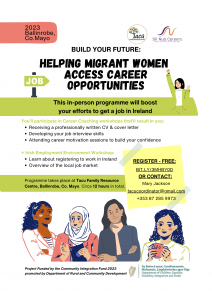Q: At the end of the interview, they asked me if I had anything I would like to add to what I had already said. It threw me, and mumbled ‘no’. At that stage, I had given a lot of myself and felt I had nothing left to say. Any suggestions? (IK, email).

A: I know exactly how you feel. You’ve been talking about yourself, what you have done, and what you are going to do, for 45 minutes or so, and now they want you to talk yet some more – but, the reality is that you must avail of the opportunity they have offered to you, writes Patricia Maloney, Career Coach, Sli Nua Careers.
By saying ‘no’, you miss a golden opportunity to further advance your case, you kill the conversation at a time when they are clearly in the mood for some more and you may even transmit a lack of interest just when you need to be conveying the very opposite.
Your objective should be to leave that room with an impactful summary of yourself ringing in their ears. You can have this summary ‘ready before the show’, as the popular TV cookery show phrase goes.
The summary must be succinct, relevant, enthusiastic and informative. It should amount to a refrain of what you’ve already told them.
Here are some points consider when preparing your impactful summary – and, by the way, I don’t mean learning a summary off, but rather having a good sense beforehand of what it will include:
- Thank them for the interview. Let them know you value being in the race for this position;
- Express the hope that you have persuaded them of your keen interest in the job – displaying enthusiasm for the role at hand is crucial, and frequently under-estimated by candidates;
- The summary should be approximately 1.5 to 2.5 minutes, no more – remember, you will have touched on many of these points earlier in the interview. Like the good marketeer, you’re just reiterating the main features;
- To persuade them that you are a quality candidate for this exact position, you could consider including the following key points:
- The range of your experience (don’t just draw on one job or piece of study – give them a flavour of your experience). Make sure to reference those parts of your experience that closely mirror the job you’re now chasing;
- Your relevant qualifications, including short courses that might just get their heads nodding – candidates can sometimes under-estimate the value of short courses;
- Two or three achievements from previous roles – actual achievements that you can quantify in terms of a percentage growth in sales or numbers of people managed, for example;
- Two or three technical competencies or skills you possess that are also listed in their job spec;
- Two or three ‘softer’ skills such as communications, interpersonal, and the like to round off your character;
- Personal attributes that you have shown in your career and life to date – e.g. you set high standards for yourself, you take responsibility for your performance, you believe in ‘measuring twice, cutting once’, and so on.
Then, when the formalities are over, leave the room secure in the knowledge that you’ve given it your best shot. And that’s all anyone can ask of themselves.






